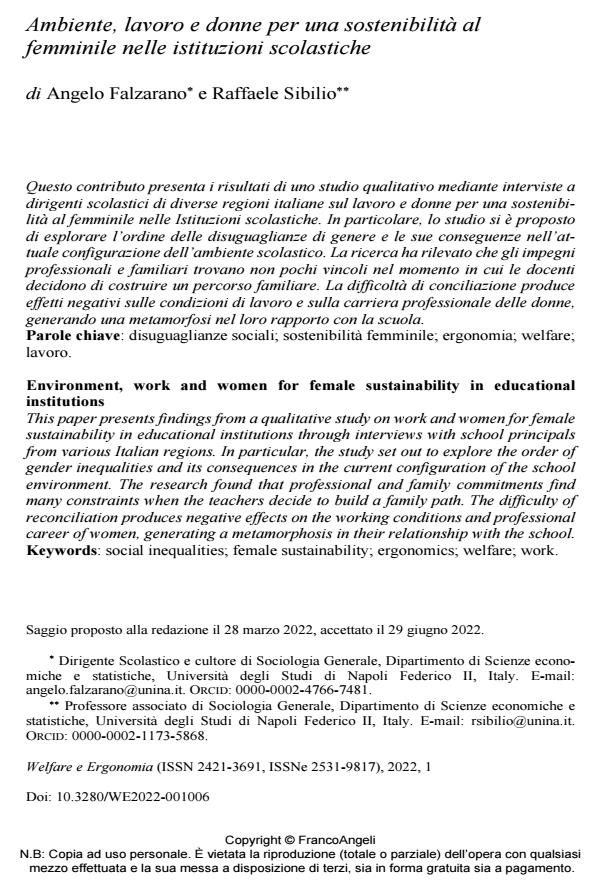Environment, work and women for female sustainability in educational institutions
Journal title WELFARE E ERGONOMIA
Author/s Angelo Falzarano, Raffaele Sibilio
Publishing Year 2022 Issue 2022/1
Language Italian Pages 11 P. 63-73 File size 186 KB
DOI 10.3280/WE2022-001006
DOI is like a bar code for intellectual property: to have more infomation
click here
Below, you can see the article first page
If you want to buy this article in PDF format, you can do it, following the instructions to buy download credits

FrancoAngeli is member of Publishers International Linking Association, Inc (PILA), a not-for-profit association which run the CrossRef service enabling links to and from online scholarly content.
This paper presents findings from a qualitative study on work and women for fe-male sustainability in educational institutions through interviews with school principals from various Italian regions. In particular, the study set out to explore the order of gender inequalities and its consequences in the current configura-tion of the school environment. The research found that professional and family commitments find many constraints when the teachers decide to build a family path. The difficulty of reconciliation produces negative effects on the working conditions and professional career of women, generating a metamorphosis in their relationship with the school.
Keywords: social inequalities; female sustainability; ergonomics; welfare; work.
- Sibilio R. e Falzarano A. (2019). La solitudine del docente. Complessità sociale e sostenibilità del lavoro. Torino: Giappichelli.
- Bauman Z. (2018). Le nuove povertà. Roma: Castelvecchi.
- Biancheri R. e Ruspini E. (2015). Interpretare il genere. Nuove tecnologie, dinamiche di salute e professioni. Pisa: University Press.
- Esping Andersen G. (2011). La rivoluzione incompiuta. Donne, famiglie, welfare. Bologna: il Mulino.
- Falzarano A. (2020). Agenda 2030 tra Sviluppo Sostenibile e cultura della sostenibilità: una lettura sociologica. Culture e Studi del Sociale, 5(1), 143-152.
- Ferrera M. (2006). Le politiche sociali. L’Italia in prospettiva comparata. Bologna: il Mulino.
- Héritier F. (1996). Masculin/féminin. La pensée de la différence. Paris: Odile Jacob.
- ISTAT (2019). I tempi della vita quotidiana. Lavoro, conciliazione, parità di genere e benessere soggettivo. Roma.
- Memoli R. e Falzarano A., a cura di (2021). Cibo, genere e salute. Un paradigma eclettico basato su differenze visibili. Milano: FrancoAngeli.
- Messing K. and Caroly S. (2011). Gender, work schedules and work/family regulation. Work, 40(S1): 1-4.
- Ministero dell’Istruzione (2020). Portale Unico dei dati della scuola. OpenData.
- Molinié A.F. (2001). Age et conditions de travail en Europe, les résultats des enquêtes européennes de 1996 à 2000. Rapport pour la fondation européenne.
- OECD (2017). Gender imbalances in the teaching profession. Education Indicators in Focus, 49. Paris: OECD Publishing.
- ONU (2015). Agenda Globale per lo sviluppo sostenibile. Camera dei deputati Dossier UE0017.htm.
- Romens A.I. (2021). Lavoro da remoto, conciliazione tra tempi di vita e lockdown: per una prospettiva di genere. Milano: FrancoAngeli.
- Sibilio R. e Falzarano A. (2020). Genitori e insegnanti: due mondi divergenti ma corresponsabil. Collana Mutamenti sociali ed istituzioni educative. Napoli: Rogiosi Editore.
- Sibilio R. e Falzarano A. (2015). Protagonisti o predestinati. Riflessioni sociologiche sulla medicina genomico-predittiva. Torino: Giappichelli.
- Silva O.F. et al. (2022). Do men and women have different musculoskeletal symptoms at the same musculoskeletal discomfort level? Ergonomics, DOI: 10.1080/00140139.2022.2088854
Angelo Falzarano, Raffaele Sibilio, Ambiente, lavoro e donne per una sostenibilità al femminile nelle istituzioni scolastiche in "WELFARE E ERGONOMIA" 1/2022, pp 63-73, DOI: 10.3280/WE2022-001006